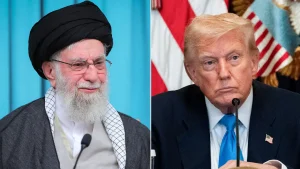Political Turmoil in Kenya: Ruling Party Member Demands Accountability with “Heads Must Roll” Declaration
Internal Dissent Grows as Ruling Party Member Challenges Ruto Administration
In an unprecedented display of internal discord, a prominent member of Kenya’s ruling party has publicly rebuked President William Ruto’s government, declaring that “heads must roll” in response to mounting national challenges. This extraordinary criticism from within the ranks signals deepening fissures in what had appeared to be a unified political front and suggests growing frustration with the administration’s direction among those previously considered loyal supporters.
The pointed remarks, delivered during what observers describe as an increasingly tense political climate, represent more than routine political disagreement. Political analysts view this public challenge as potentially marking a significant turning point in Ruto’s presidency, which has faced escalating pressure on multiple fronts including economic instability, security concerns, and governance questions. The statement’s forceful language—particularly the demand for leadership changes implied by “heads must roll”—indicates a level of dissatisfaction rarely expressed publicly by members of a sitting president’s own political coalition.
“This isn’t merely political posturing or a negotiating tactic,” explains Dr. Njeri Kamau, political science professor at the University of Nairobi. “When a member of the ruling party uses such unambiguous language publicly, it reflects genuine alarm about the government’s trajectory and performance. The phrase ‘heads must roll’ carries cultural weight in Kenyan politics—it’s a call for accountability through leadership changes, not just policy adjustments. This represents a serious challenge to President Ruto’s leadership from within his own political family.”
Historical Context and Current Tensions
Kenya’s political landscape has long been characterized by complex alliances and internal party dynamics, but open rebellion within ruling coalitions has historically preceded major political realignments. President Ruto, who assumed office in September 2022 following a contentious election, campaigned on promises of economic revitalization, government accountability, and a “bottom-up” economic model intended to empower ordinary citizens. However, the implementation of these policies has drawn criticism from various quarters, including business leaders, opposition figures, and civil society organizations.
The dissenting party member’s comments come amid several national challenges that have tested the administration. The Kenyan shilling has experienced significant depreciation against major currencies, while inflation has eroded purchasing power for many citizens. Additionally, controversial tax proposals and public debt concerns have fueled public demonstrations in recent months, creating a volatile political environment. Security issues in certain regions and allegations of corruption within government ranks have further complicated Ruto’s governance agenda.
“The timing of this internal criticism is particularly significant,” notes Charles Mwangi, a veteran political commentator based in Nairobi. “It comes when President Ruto is attempting to navigate multiple crises simultaneously while maintaining international partnerships and domestic political support. The fact that this criticism emerges from within the ruling party suggests the president’s coalition may be fragmenting under the weight of governance challenges. Historically, such public breaks with party discipline have preceded larger political realignments in Kenya.”
The Implications for Governance and Political Stability
Political observers suggest this public rebuke could force President Ruto into a difficult position: either acknowledge the criticism by making cabinet changes and policy adjustments, or risk further internal rebellion by dismissing the concerns. The situation highlights the delicate balance Kenyan presidents must maintain between different factions within their political coalitions, especially in a system where party loyalty has often proven fluid.
The “heads must roll” declaration carries particular significance in Kenya’s political context, where cabinet reshuffles and dismissals of senior officials typically follow such pronouncements from influential political figures. If President Ruto chooses to ignore this call, he risks appearing unresponsive to legitimate concerns, potentially encouraging further public dissent from other members of his coalition. Conversely, making changes in response to the criticism might be interpreted as weakness or an admission of policy failures.
“President Ruto now faces a classic governance dilemma,” explains Maria Ochieng, governance specialist at the East African Policy Institute. “He must determine whether this criticism represents an isolated opinion or reflects broader sentiment within the party. If it’s the latter, ignoring these concerns could accelerate party fragmentation. However, making substantial changes risks disrupting his administration’s agenda. Either way, this public criticism weakens his position and complicates his ability to implement policies effectively.”
Public Reaction and Opposition Response
The ruling party member’s rebuke has resonated widely with Kenyan citizens across political divides, trending on social media platforms and dominating radio talk shows nationwide. Many citizens have expressed support for the call for accountability, reflecting growing public frustration with economic challenges and governance issues. Opposition leaders have quickly seized upon the comments, characterizing them as confirmation of their own criticisms of the administration.
“When those closest to the president publicly express such concerns, it validates what many Kenyans have been feeling,” said a prominent opposition figure who requested anonymity. “This isn’t about politics anymore—it’s about the fundamental direction of our nation and whether the current leadership can deliver on its promises to the Kenyan people.”
Civil society organizations have similarly welcomed the call for accountability, with several prominent non-governmental organizations issuing statements supporting greater transparency in government operations. Business leaders, concerned about economic stability and policy predictability, have carefully monitored the situation, with some privately expressing hope that the criticism might lead to more consultative policy development processes.
International Implications and Economic Concerns
The international community has closely watched these developments, particularly Kenya’s financial partners and diplomatic allies. Kenya’s strategic position in East Africa makes its political stability a matter of regional and global interest. Diplomatic sources indicate that while foreign missions in Nairobi have not commented publicly on the internal political discord, they are monitoring the situation closely for potential impacts on international agreements, security cooperation, and economic partnerships.
Economic analysts have noted that political uncertainty typically affects investor confidence, potentially complicating Kenya’s efforts to attract foreign investment and manage its public debt obligations. The timing is particularly sensitive as Kenya navigates negotiations with international financial institutions and implements economic reforms intended to stabilize public finances.
“International partners and investors value predictability above all,” explains economist Samuel Kariuki from the Nairobi Economic Forum. “Internal political discord creates uncertainty about policy direction and implementation capacity. While robust political debate is healthy in a democracy, open rebellion within the ruling party raises questions about the administration’s stability and its ability to maintain consistent economic policies. This comes at a particularly challenging time for Kenya’s economy, potentially complicating international economic partnerships.”
The Path Forward: Reconciliation or Realignment?
Political insiders suggest President Ruto has begun private consultations with party leaders to address the concerns raised and prevent further public criticism. Sources close to the presidency indicate that a response strategy is being formulated, potentially including both personnel changes and policy adjustments to address the issues raised by the dissenting party member and other internal critics.
The coming weeks will prove critical in determining whether this public rebuke represents a momentary disagreement or the beginning of a more significant political realignment. Kenya’s political history suggests that such internal challenges often precede broader coalition reshuffling, particularly as the country moves closer to the next election cycle. For ordinary Kenyans, the hope remains that this internal accountability demand might translate into improved governance and economic management.
“The ultimate test will be whether this internal criticism leads to meaningful improvements in government performance,” concludes Dr. Kamau. “Kenyans are less concerned with political maneuvering than with tangible improvements in their daily lives. If this call for accountability results in more responsive and effective governance, it could ultimately strengthen Kenya’s democratic institutions. If not, it may simply represent another chapter in Kenya’s complex political narrative—significant in the moment but ultimately overshadowed by continuing governance challenges.”
As the nation watches for President Ruto’s response to this unprecedented internal challenge, the stakes remain high for Kenya’s political stability, economic recovery, and democratic development. The phrase “heads must roll” has set in motion political dynamics that will shape the administration’s approach in the months ahead—and potentially the future direction of Kenyan politics.







